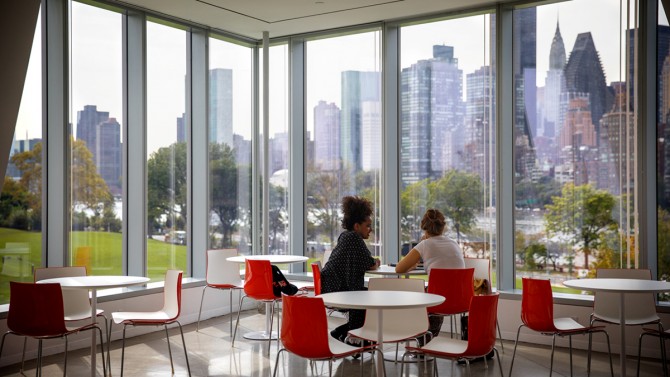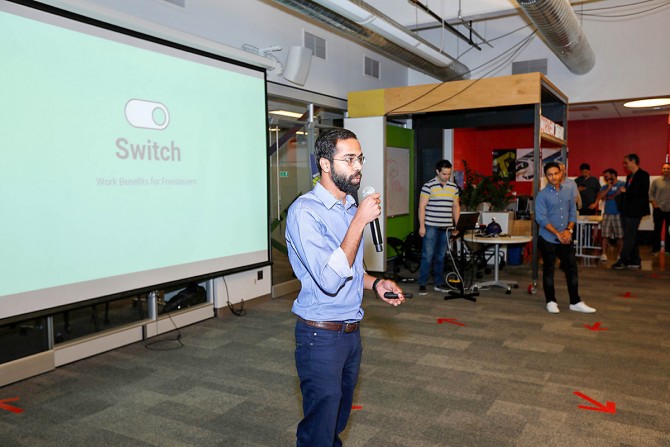Cornell Tech leverages academic links with Cornell campuses
By Susan Kelley
The new Roosevelt Island campus of Cornell Tech has catalyzed a slew of innovative academic programs that will benefit not only Cornell Tech students but also students from the Ithaca campus. And those programs will deepen the symbiotic academic partnership that links Cornell’s New York state campuses, administrators say.
“Cornell Tech is an integral part of the Cornell University mission, with each campus supporting and reinforcing the other,” said Charles Whitehead, the Myron C. Taylor Alumni Professor of Business Law and director of the Law, Technology and Entrepreneurship Program at Cornell Tech. “Cornell Tech has from inception been focused on its educational mission: bringing faculty together from multiple disciplines to both research and teach. Add to that the physical space on Roosevelt Island, and it is a dominating presence in the law, technology and businesses fields.”
The Cornell SC Johnson College of Business now has a significant presence in The Bridge building on the Cornell Tech campus, where it has leased 20,000 square feet of space.
On the Roosevelt Island campus, Cornell Tech and SC Johnson will host several classes designed to mix Ithaca MBA students with Johnson-Cornell Tech MBAs. They include four tech-heavy weekend courses this fall, and half-semester intensives in financial tech and digital marketing this spring.
“We’re really taking advantage of the Cornell Tech campus being in New York, creating something new and powerful and making it available to both Cornell Tech and Ithaca students,” said Doug Stayman, associate dean and faculty director of the Johnson Cornell Tech MBA. “Cornell Tech can’t do what it’s doing without being part of Cornell. But we hope we can be a laboratory. We’re trying new things.”
Similarly, J.D. students at Cornell Law School can spend a semester at Roosevelt Island taking classes that relate to technology and intellectual property.
Half of the new Cornell Tech master’s students this fall are enrolled in Master of Engineering programs – including a new degree in electrical and computer engineering that launched this fall. In addition, the College of Engineering has relocated its Cornell Financial Engineering in Manhattan program, which had been housed near Wall Street, to Roosevelt Island. And although Cornell Tech offers only graduate degrees, the College of Engineering will offer internships to five undergrads in summer 2018 to work with Cornell Tech faculty.
Faculty are perhaps the strongest glue that hold together the campuses. Most professors on the Tech campus are full members of a department in Ithaca or at Weill Cornell Medicine. In some cases, they are Technion-Israel Institute of Technology faculty.
That was a conscious decision from the beginning, said Lance Collins, the Joseph Silbert Dean of Engineering, who co-developed Cornell Tech’s academic structure with Daniel Huttenlocher, dean and vice provost of Cornell Tech. “We had seen the failures of other institutions that hadn’t done that,” he said.
Every faculty member is vetted by both campuses. Collins noted, “That has led to outstanding hires and a built-in connection between the campuses.”
Faculty frequently travel between campuses, and they’re building connections across disciplines as well, said Deborah Estrin, associate dean and the Tishman Professor of Computer Science at Cornell Tech and professor of public health at Weill Cornell Medicine.
“Even at our size of about 25 active-research technical faculty, at least one-third have early or active collaborations with Weill Cornell Medicine colleagues,” Estrin said. “And that crosses all four of our Faculty of Computing and Information Science and College of Engineering departments at Cornell Tech. That’s huge!”
That cross-disciplinary ethos is built into Cornell Tech academics, administrators say. For example, in Startup Studio, a required part of all Cornell Tech master’s programs, students design a product with an industry partner. Each team might include two or three engineers, an MBA student and a law student.
“That’s an incredibly interesting, unique environment in which to learn your craft,” Collins said. “They’re also learning how to communicate and work in close proximity with people from very different backgrounds and across cultural differences. That’s an important and unique aspect to the education at Cornell Tech.”
Computing and Information Science (CIS) Dean Greg Morrisett added: “What I find exciting about the Tech campus is that it opens up new vistas for Cornell CIS. We’ve always been particularly strong in foundational computing and information science research, but haven’t enjoyed a direct connection to the tech industry until now.
Media Contact
Get Cornell news delivered right to your inbox.
Subscribe
